Even though I’m still not sure what to call this current decade, (the Tens?), I do know that it’s been a wonderful time for boardgames, which makes coming up with my favourite 10 games of the 2010s all the more difficult. Narrowing down a list to 10 was tough, but I found one other boardgame trend factored into how I came up with my list: the cult of the new.
There are so many great new games coming out that I am often only playing games that less than a year old at any given time, this can be great, but it also means that older games can sometimes fall by the wayside and it’s easy to see the new hot game as the best game. This led me to a big question, “How long does it take to know if a game is great?” While I do not have a definitive answer to the questions I did leave a few games off the list because I felt they needed more time to marinate in my brain and perhaps get a few more plays in. The two games I struggled with most were Underwater Cities (2018) and Horrified (2019). I love both games and if I made this list in 2025, I would not be surprised to see them on a revised list, for now though both fall just outside, as I’m not 100% sure I will love these games 12 months from now.
With all that said, here are my top 10 games sorted by release date year.
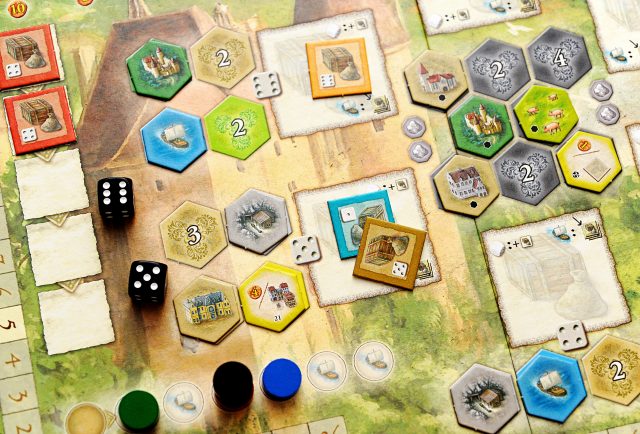
The Stefan Feld classic (yes it’s only been out eight years but it feels as it has earned classic status) offers a great mix of strategy and tactics. The one thing I quickly figured out when I got into boardgaming seriously is that I am not a huge fan of games that are 100 per cent (or mostly) strategic. I prefer games that reward good tactical decisions, where on a turn your long-term game strategy might be to do A, but tactically right now it makes more sense to do B. For me Castles of Burgundy is a great blend of strategy and tactics. Because of this I feel its has more replayability than games where it often feels as if people who know the game well have a strategy for each round of the game and rarely veer off of that plan. For those that hate dice rolling, Feld has added plenty of ways to mitigate bad rolls. Also, and I am sure some Burgundy experts will dispute me on this point, it feels as if there are several different paths to victory, which I rate as a very important feature in games.
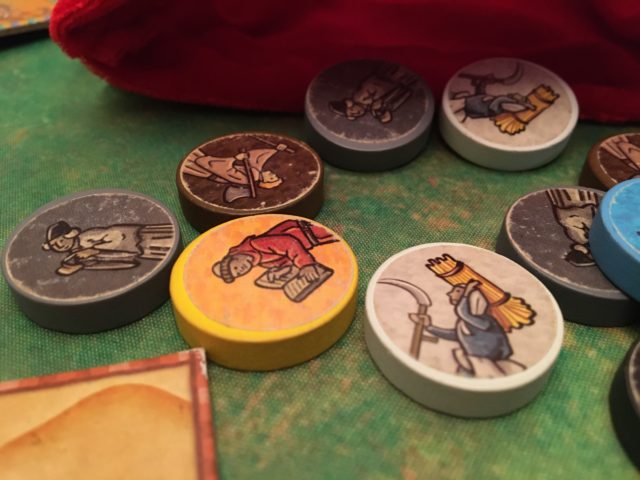
The bag builder by Reiner Stockhausen was not an instant love for me, but my affection for the game has grown over time. The randomness of the bag pulling mechanic and the hour glass tiles forces players to be more flexible in what they are aiming to do each round. It also rewards those that build a better player board – through technology tiles (or as I call them cogs) and acquiring buildings – and recruiting character tiles that help you do actions you want and sending those to the town hall that aren’t helping much. Orléans is one of the few games that I will rarely so no to playing. I should note I have played the Trade & Intrigue expansion a few times, but have yet to try Invasion. If anyone wants to teach me that one I would jump at the opportunity.

When I first jumped into more serious boardgaming through a local MeetUp group, I found myself quickly falling in love with the more player-interactive games, especially social-deduction games such as One Night Ultimate Werewolf and Coup. I am not one of those people who wants to play boardgames and not have any interaction with other people at the table. If I wanted to play a game and not talk to people I have video games for that. Part of the reason, and I’m not the first to espouse this theory, that board games have become more mainstream over the past decade is the analog and social experience they offer and that people are craving. Dead of Winter blends that social deduction aspect of gaming I love, with a large game with strategic and tactical decisions. Dead of Winter by Jonathan Gilmour, Isaac Vega, is fine as a co-op game, but I love it as a semi co-op. I feel it adds to the thematic nature of the game, where you can never completely trust those you are trying to build a new world with. Dead of Winter was the first game that I NEEDED in my collection. It still holds up to this day and the Long Night expansion is a nice addition. I love teaching new people Dead of Winter, even to the point of treating it as a step right after entry-level games, which has not always worked out the best.

While with Dead of Winter some of my experiences teaching newbie games has not gone well, Deception: Murder in Hong Kong by Tobey Ho is almost always a big hit when it hits the table with my less-experienced gamer friends. It’s a great party game because it has very flexible player count (4-14), a short play time (20 minutes) and is easy to learn. The one rule I have is do not let new gamers play as the Forensic Scientist for the first game. It’s better to ease people into the game, and since Deception is such a quick game (I have never played just a single game of it) new gamers can opt to try the Forensic Scientist role in a subsequent game. Deception has all the great social interaction that I love about board games coupled with a solid deduction game and hidden traitor(s). Whereas some games rely on players to lie about their roles, which can make some people uncomfortable, if you are the murderer in Deception, you don’t really have to do any lying. Just sit back and let the other players scramble to figure things out, sure go ahead and throw out a random accusation that fits the clues, and if someone starts pointing at your item cards, shrug your shoulders. While the theme of murder may turn off some gamers, Deception can elicit some laughs during game play. On a recent Dice Tower video titled Top 10 Hilarious Games, Deception was on both Sam and Zee’s list. For me that was confirmed at a recent play when everyone broke up in hysterics over the various clue cards trying to figure how those items would be used to kill someone.

Sitting currently at No. 3 on BoardGameGeek’s list of top board games, I certainly will not be alone when it comes to putting Terraforming Mars by Jacob Fryxelius on a top games of the decade list. When it first came out it seemed as if Terraforming Mars was being played at every table at boardgaming events. Three years later, it still feels that way. Thanks in part to a continuing flow of expansions, Terraforming Mars seems as if its been the new “hotness” for three years in a row. With so many cards, a wide variety of corporations and now all of the expansion goodies, I find there are so many different ways to play and win Terraforming Mars, though I don’t often win it. And perhaps that is what makes Terraforming Mars so great. For me, even when I lose (sometimes badly) I still feel as if I am making interesting decisions and that makes for an enjoyable game. While some more casual gamers may see Terraforming Mars as a bit too heavy and long, I think for the most part it’s on the good side of approachable for a medium-heavy game.
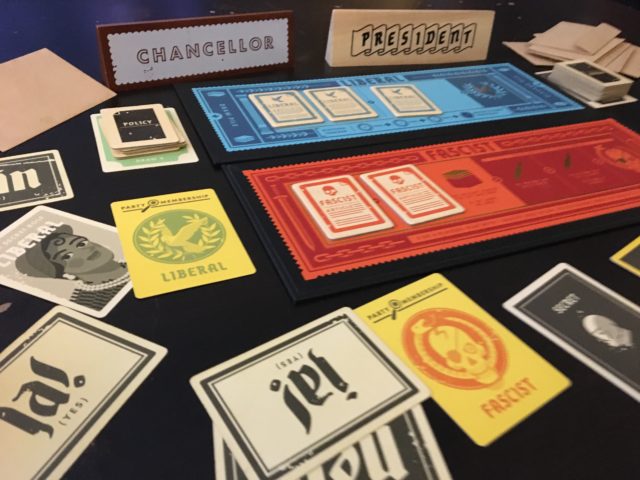
My first foray into Kickstarting a board game turned out wonderfully (I’ve had some less-than stellar experiences since then). When Secret Hitler by Mike Boxleiter, Tommy Maranges and Max Temkin hit Kickaster I was already a social-deduction junkie, soI was super excited for something new. I was not disappointed. Secret Hitler builds off ideas of other social-deduction games and takes them to another level. This game has led to had some of my best gaming experiences, complete with surprise wins, shocking betrayals and frustrating defeats. While the game’s name has turned off many people, I do defend the game’s theme, because if you look at the message I feel the designers are trying to say with Secret Hitler, I feel as if it’s a valuable one. In the game Liberals are sometimes rewarded, and possibly encouraged, to play Facists policies to gain a power that might help them win the game. And Facists will often play Liberal policies to hide their true motives. In the real world it can be a slippery, sneaky slide to facism, if people aren’t careful.
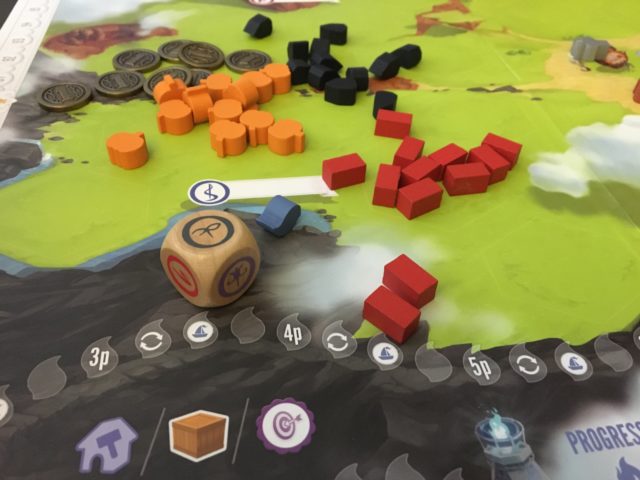
When I first heard about the concept of legacy games I was instantly intrigued. I love the idea of building on something from one game to another. Of course the downside to legacy games is that you need to find a dedicated group whose schedules match up. My first attempt at one was Pandemic Legacy Season 1, sadly we got stuck in midway through the campaign, through no fault of the game’s. Had I finished up that one, perhaps it would be on the list. With Charterstone Jamey Stegmaier created a game that had this little moments of excitement throughout each game and the campaign itself. Even when someone else is opening a crate the rest of the rest of the players at the table are on pins and needles waiting to see what’s about to happen. Stegmaier put some very good catch up mechanics in the game, so if you lose the first couple games you can still potentially win future games and the campaign itself. The build-up of rules and complexity, coupled with the varying conditions for each round of the campaign kept each game fresh. I managed to finish Charterstone, not just once, but twice. It is an incredible achievement.

Had this list been made a year ago, Codenames would probably be on it. As it stands now Just One has already surpassed Codenames as my go-to party game. It’s a simple concept, yet its inherently replayability means it works with a wide variety of people. In some ways Just One doesn’t even have to be a game, it can be treated as an activity, where no one is scoring and you just keep going for as long as you want. I look back at so many painful nights playing Cards Against Humanity for hours upon hours, begging to switch things up and wish Just One had been created 10 years ago.

As you can probably tell by now I am instantly attracted to games that play well with both my more hardcore gamers friends and casual gamer friends. Space Base fits this mould perfectly. The dice-rolling engine builder by John D. Clair is always a good time. I also enjoy playing it at all of its listed player counts (2-5), as the number of players requires tweaks in strategy. The game is also quick enough that if the dice aren’t going your way, it’s not as if you are stuck at the table for three hours with no chance at victory.
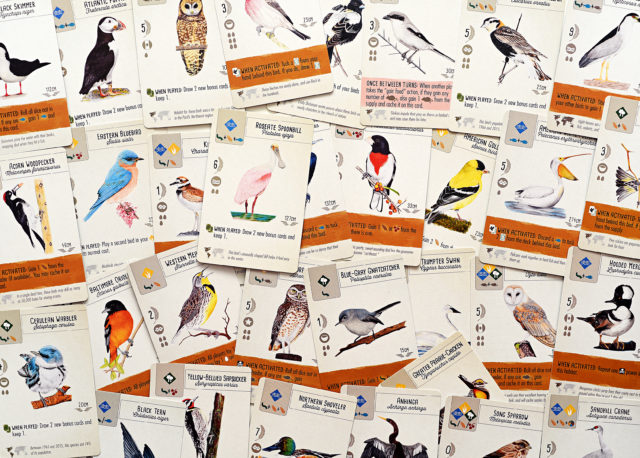
Despite not even being out for a year, Wingspan by Elizabeth Hargrave has made a large impact on the boardgaming world. Wingspan became a mainstream hit thanks to its incredible art by Ana Maria Martinez Jaramillo, Natalia Rojas and Beth Sobel, a captivating theme and interesting gameplay that is both simple to teach and difficult to master. While not a light-game, in many ways because of the theme and art, it can be a perfect entry-level game. Yet, unlike many other entry-level games, Wingspan rewards multiple plays thanks to its large variety of bird cards. The new European Expansion is a great sign for the future. It does what great expansions do, add more content without making the game significantly more complex or longer.
Hopefully I won’t look back on this list a year, or five years from now and regret my decisions, but if I do that just means I likely found a new great game I haven’t played yet, and that’s never a bad thing.
Comments
No comments yet! Be the first!